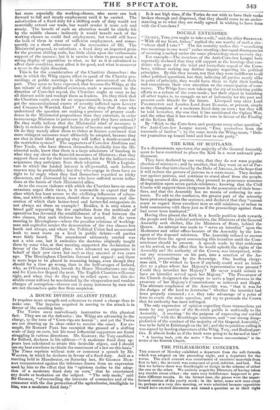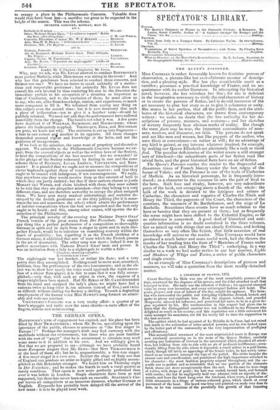THE PHILHARMONIC CONCERTS.
THE concert of Monday exhibited a departure from the safe formula which was adopted on the preceding night, and a departure for the worse. The sixth concert was constructed of excellent materials from first to last ; the seventh was composed of good, inferior, and bad. Not that we believe there was forethought or design in the scheme of either the one or the other. We entirely acquit the Directors of having taken any trouble about either : the same easy indifference happened to pro- duce different results. In the former case, the pieces were the unper- formed residue of the yearly stock ; in the latter, some new ones crept in, perhaps at a very thin meeting, or were admitted because opposition would have excited discussion and raised a question as to their right to occupy a place in the Philharmonic Concerts. Valuable time would thus have been lost—a sacrifice too great to be expected in the height of the season. This was the scheme. SEVENTH CONCERT, MONDAY, MAY 31.
ACT I.
Sinfonia in G minor.. MOZART. Scala. Madame Doaos GRAS, Le calme se repand." Robin des Bois, (Der Freischnts) C. M. VON WEBF R.
Concerto, Pianoforte, C minor. Mr. W. S. BENNETT Batons
Aria. Miss M. B. HAWED. 0 Salutaris hustia" Caxtruntru.
Overture, MS., The Regicide C. Lucas. ACT la.
Sinfouia, Pastorale BEETHOVEN. Air du Rossignol, Madame Donos GRAS. Flute Obligato, Mr. DOREN LEBRUN. Caprice. Violin, M. Vraorrxrars VIEUXTEMPS. Ana. Mr. BALFE, " II i*osier sta negli oggetti " (thins ed Euridice) HAYDN• Overture, Nero', lictssaasa.
Leader, Mr. F. CRAMER—Conductor, Mr. LUCAS.
Why, may we ask, was Mr. Lucas allowed to conduct BEETHOVEN'S most perfect Sinfonia, while MOSCHELES was sitting in the room ? And why has this gentleman been selected to conduct three concerts, and BISHOP not one ? We have no desire to speak unkindly of a merito- rious and respectable performer ; but assuredly Mr. Lucas does not -consult his own interest by thus rendering his seat in the direction the immediate prelude to his occupation of a situation so important as that of Conductor, and to the exclusion of those, he must allow us to say, who are, alike from knowledge, station, and experience, so much more competent to fill it. We refrained from saying any thing on this subject even the second time ; but it is now necessary that such a piece of indiscretion—not to give it a harsher term—should be publicly rebuked. We need not add that the performances have suffered materially from the change. The band is not what it was. A few years have deprived it of WILLMAN, Nicutm.sort, and MACKINTOSH; whose places are inadequately supplied. TOLBECQUE, ELLA, and ROUSSELOT are gone, we know not why. The orchestra is cut up into fragments— a bass in one corner an another in its opposite. All these changes demanded unusual vigour and knowledge at the helm, and not the guidance of inexperience.
If we look at the selection, the same want of propriety and discretion appears. We subscribe to the Philharmonic Concerts because we ex- pect, from the avowed objects as well as the written laws of the Society, to hear the compositions of the best masters ? Are we rewarded ? or is the pledge of the Society redeemed by finding in one and the same scheme those of BENNETT, LUCAS, LEBRUN, VIEUXTEMPS, and REIS- SIDER ? It is pleaded that we ought not to measure the compositions of clever beginners against those of consummate masters ; and that they ought to be treated with indulgence, if not encouragement. We reply, that anywhere else they would receive from us that amount of both to which they are justly entitled ; but that if their authors choose to jostle _MOZART and WEBER, and claim kindred with them, they must submit to be told that they are altogether mistaken—that they belong to a very different class, and are therefore unworthy to occupy the place assigned them. We have seen many musical undertakings and societies de- stroyed by the foolish goodnature or the dirty jobbing (for it is some- times the one and sometimes the other) which admits the performance of inferior compositions where the best are expected and the best only ought to be heard ; and this, among other causes, will operate the de- struction of the Philharmonic.
The principal novelty of the evening was Madame DORUS GRAS' French version of the great scena from Der Freischutz. To expect any thing like a perfect performance of a composition so thoroughly German in spirit and in style from a singer in spirit and in style alto- gether French, would be to calculate on something scarcely within the reach of possibility : but, regarding it as the French clothing of a German statue, it exhibited that sort of taste which the French possess in the art of decoration. The other song was more ; indeed it was in perfect accordance with Madame Doaus GRAS' taste and power. It was an invitation from a lady to a nightingale to warble a duet- - Chautons, chautons ensemble, E chantons tour a tour."
The nightingale was her brother, or rather his flute; and a very pretty duet they accomplished. Nothing could be more neat, accordant,
brilliant, than the performance of the two instruments ; and as the ob- ject was to show how nearly the voice could approach the rapid execu- tion of a clever flute-player, it is fair to state that it was fully accom- plished,—only that, with such an object in view, the expense of a singer might have been spared. Had Mr. RIBAS or Mr. Canntlescended from his stand and occupied the lady's place, we might have had a cadenza twice as long (that is, ten minutes instead of five,) and twice as difficult, without costing the Society a shilling. To such a degrading employment of the human voice Miss HAWES'S song formed an admir- able and welcome contrast.
VIEUXTEMPS'S Concerto was a very trashy affair : a quarter of an hour's arpeggio and rattle over the same chords—a mere effort of the fingers, tedious and uninteresting.



























 Previous page
Previous page